代词+数词
英语实词和虚词的分类
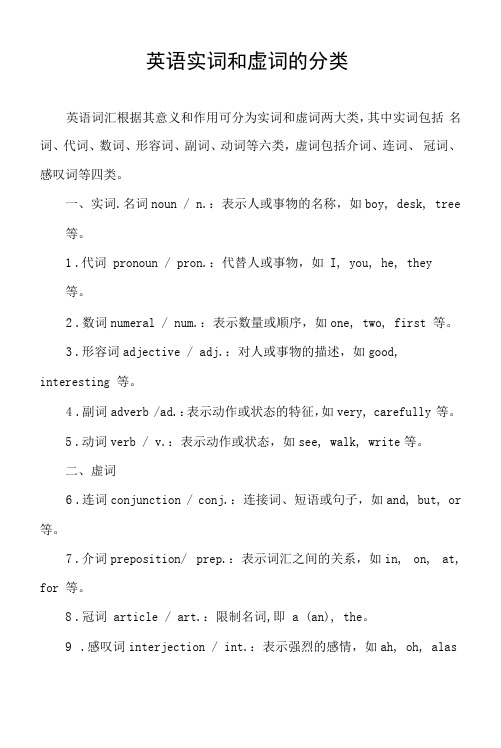
英语实词和虚词的分类英语词汇根据其意义和作用可分为实词和虚词两大类,其中实词包括名词、代词、数词、形容词、副词、动词等六类,虚词包括介词、连词、冠词、感叹词等四类。
一、实词.名词noun / n.:表示人或事物的名称,如boy, desk, tree等。
1.代词 pronoun / pron.:代替人或事物,如 I, you, he, they等。
2.数词numeral / num.:表示数量或顺序,如one, two, first 等。
3.形容词adjective / adj.:对人或事物的描述,如good, interesting 等。
4.副词adverb /ad.:表示动作或状态的特征,如very, carefully 等。
5.动词verb / v.:表示动作或状态,如see, walk, write等。
二、虚词6.连词conjunction / conj.:连接词、短语或句子,如and, but, or 等。
7.介词preposition/ prep.:表示词汇之间的关系,如in, on, at, for 等。
8.冠词 article / art.:限制名词,即 a (an), the。
9.感叹词interjection / int.:表示强烈的感情,如ah, oh, alas等。
英语里有不少词可以属于几个不同词类,如sleep既可属于动词,也可属于名词;early既可属于形容词,也可属于副词;after既可属于介词,也可属于连词;since则既可以是介词和连词,也可以是副词。
如:If you want to catch the early bus, you must get up early. 你若想赶上早班车,你就得早起。
(句中的第一个early为形容词,第二个early 为副词)。
英语语法——代词与数词

英语语法——代词与数词代词一.概说定义:代词(pronoun)是代替名词的词:1.1代词在句子中的功用1)和名词一样,可作主语、宾语和表语。
b)有些代词和形容词一样,可作定语。
如:I am reading The Arabian Nights.我在读《天方夜谭》。
(作主语)This is John Smith speaking.(打电话用语)我是约翰•史密斯。
(作主语)Can I help you?我能帮你的忙吗?(作宾语)That's all.我的话完了。
(作表语)2)His father is an eye-doctor.他父亲是个眼科医生。
(作定语)All men are equal.所有的人都是平等的。
(作定语)3)格的变化有些代词有格的变化,如I 我(主格),me我(宾格),Who谁(主格),whom谁(宾格)。
某些代词有所有格,如whose谁的,other's别人的,somebody's某人的,one's一个人的。
4)单复数形式有些代词有单数和复数形式。
少数代词的复数形式和名词的复数形式的变化规则相同,如one-ones,other-others。
其他如人称代词、物主代词、自身代词和指示代词等,其复数形式与此不同,须个别记忆。
5)有或没有冠词代词之前一般不用冠词,只有少数例外。
如:the other,the others,a few,a little等。
种类1.2英语有下列几种代词:1)人称代词(personal pronoun)a)主格:I,he,she,it,we,you,they.b)宾格:me,him,her,it,us,you,them.2)物主代词(possessive pronoun):a)形容词性物主代词:my,his,her,its;our,your,their.b)名词性物主代词:mine,his,hers,its,ours,yours,theirs.3)自身代词(self-pronoun):myself,yourself,himself,herself,itself,ourselves,yourselves,themselves,oneself.4)相互代词(reciprocal pronoun):each other,one another.5)指示代词(demonstrative pronoun):this,that,these,those,such,same.6)疑问代词(interrogative pronoun):who,whom,whose,which,what.7)关系代词(relative pronoun):who,whom,whose,which,that.8)不定代词(indefinite pronoun):some,something,somebody,someone,any,anything,anybody,anyone,no,nothing,nobody,no one,every,everything,everybody,everyone,each,much,many,little,a little,few,a few,other,another,all,none,one,both,either,neither.二.人称代词概说表示"我',、"你"、"他"、"我们"、"你们"、"他们"等的词,叫做人称代词。
代词、数词、形容词及副词用法归纳
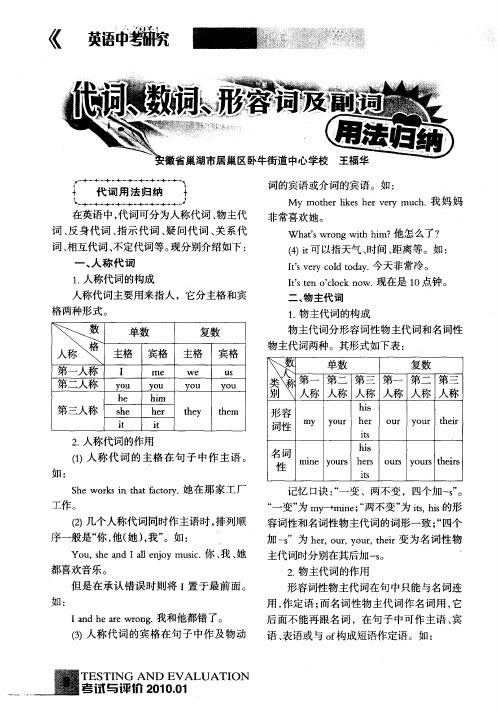
英 语
+
。
代 词 用 法 归 纳
.+ . + . + + 。 + + 。 + +
+
. .
词的宾语或介词的宾语。如 :
Mymohrl e hrvr muh 我 妈 妈 te ks e e c. i y 非常 喜欢她 。 W ht ogwi i 他怎 么 了? a’wrn t h s h m? f i可 以指 天气 、 4 t ) 时间 、 等 。如 : 距离
工作 。
“
一
记忆 口诀 :一 变 、两不 变 ,四个 加 一” “ s。 变 ” m mie “ 为 n ;两不 变 ” i. i的形 为 t hs s
( 几个人称代词同时作主语时 , 2 ) 排列顺
容词性和名词性物主代词的词形一致 ;四个 “ 加一”为 h O yu,hi变为名词性物 S e' U o rt r r e 主代词时分别在其后加一 。 S 2 物主代词的作用 . 形容词性物主代词在句 中只能与名词连 用, 作定语 ; 而名词性物主代词作名词用 , 它 后面不能再跟名词 ,在句子中可作主语 、 宾 语、 表语或与 o 构成短语作定语 。如 : f
●
2 人称代词的作用 . ( 1人称代 词 的主格 在句子 中作主语 。 1 )
如:
1S t
名 词 hs i 性 m n VUs es o r o r te s le O r h r US us hi V r
lS t
Sewok a f tr. 在那 家工 厂 h rsnt ta oy 她 i h c
复数 or l s us v ee yu e e or l s sv
te e e hmsvs l
2 在电话用语 中,使用 t s ta h . h 和ht i i 。t s 指代 自己, a指代对方。如 : h tt
数词,代词
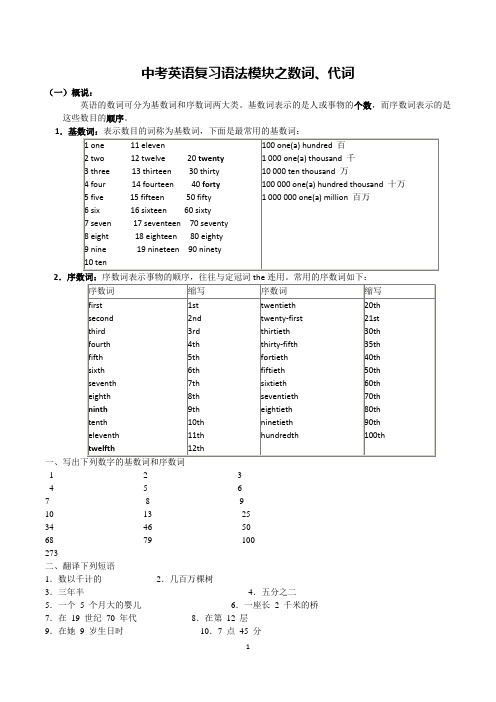
中考英语复习语法模块之数词、代词(一)概说:英语的数词可分为基数词和序数词两大类。
基数词表示的是人或事物的个数,而序数词表示的是这些数目的顺序。
12一、写出下列数字的基数词和序数词1 _________ __________2 _________ __________3 _________ __________4 _________ __________5 _________ __________6 _________ __________7 _________ __________ 8 _________ __________ 9 _________ __________10 _________ __________ 13 _________ __________ 25 _________ __________34 _________ __________ 46 _________ __________ 50 _________ __________68 _________ __________ 79 _________ __________ 100 _________ __________273 _________ __________二、翻译下列短语1.数以千计的___________ 2.几百万棵树______________3.三年半_____________________________________ 4.五分之二________5.一个5 个月大的婴儿____________________ 6.一座长2 千米的桥______________________7.在19 世纪70 年代___________ 8.在第12 层_______________9.在她9 岁生日时________________ 10.7 点45 分___________________________基数词的用法1、表示计量:表示事物的计量,即事物的长度、宽度、深度和高度,应采用基数词。
代词、数词、冠词、形容词、副词
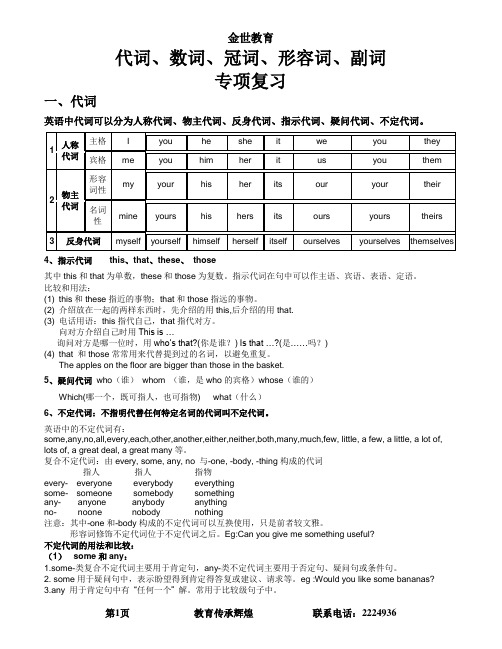
代词、数词、冠词、形容词、副词专项复习一、代词英语中代词可以分为人称代词、物主代词、反身代词、指示代词、疑问代词、不定代词。
1 人称代词主格I you he she it we you they 宾格me you him her it us you them2 物主代词形容词性my your his her its our your their名词性mine yours his hers its ours yours theirs3 反身代词myself yourself himself herself itself ourselves yourselves themselves4、指示代词this、that、these、those其中this和that为单数,these和those为复数。
指示代词在句中可以作主语、宾语、表语、定语。
比较和用法:(1) this和these指近的事物;that和those指远的事物。
(2) 介绍放在一起的两样东西时,先介绍的用this,后介绍的用that.(3) 电话用语:this指代自己,that指代对方。
向对方介绍自己时用This is …询问对方是哪一位时,用who’s that?(你是谁?) Is that …?(是……吗?)(4) that 和those常常用来代替提到过的名词,以避免重复。
The apples on the floor are bigger than those in the basket.5、疑问代词who(谁)whom (谁,是who的宾格)whose(谁的)Which(哪一个,既可指人,也可指物) what(什么)6、不定代词:不指明代替任何特定名词的代词叫不定代词。
英语中的不定代词有:some,any,no,all,every,each,other,another,either,neither,both,many,much,few, little, a few, a little, a lot of, lots of, a great deal, a great many等。
代词、数词、形容词、副词

第三节代词代词是为了避免重复而用来代替名词的词。
英语代词共有9种:人称、物主、反身、相互、指示、疑问、关系、连接和不定代词。
大多数代词具有名词和形容词的作用。
人称代词人称代词有人称、性、数、格之分。
人称代词在句中的排列顺序一般是:you 在最前,I, we在最后,如:you, he and I。
人称代词的主格在句中作主语:They are playing football on the playground.人称代词的宾格在句中作动词或介词的宾语:Our En glish teacher taught us an En glish song. His parents are look ing for him.要注意人称代词it 的特殊用法:Look at that poor little child. It has just falle n dow n. It is n ecessary to buy that dict ion ary. I con sider it imp orta nt to ask him for advice. It is five o clock. It is fine today. It was a bicycle that Ireceived yesterday.物主代词表示所有关系的代词叫物主代词。
物主代词可分为形容词性(一般作定语)和名词性(作主语、表语、宾语)物主代词两大类。
物主代词的各种形式如下表:形容词性物主代词除作定语外,还可放在动名词短语之前,作短语的逻辑主语。
如: Do you mi nd my opening the door? His coming made us very happy. We can ' believe her break ing the law.反身代词表示“我自己”、“你自己”、“他自己”、“我们自己”、“你们自己”、“他们自己”的代词叫反身代词。
名词,动词,形容词,数词,量词,代词的定律
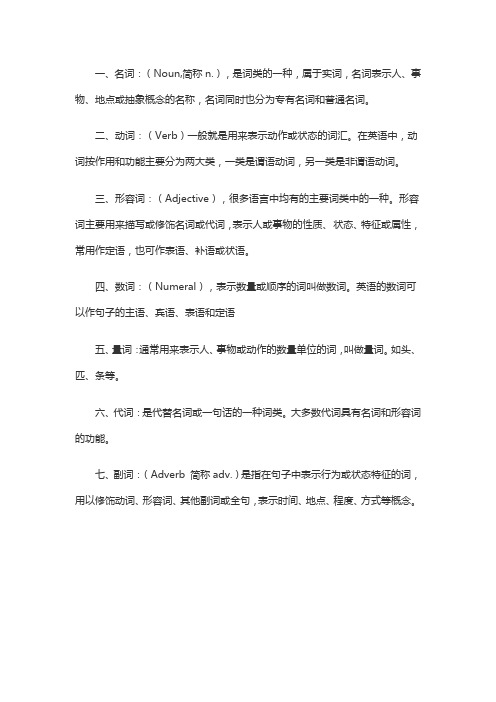
一、名词:(Noun,简称n.),是词类的一种,属于实词,名词表示人、事物、地点或抽象概念的名称,名词同时也分为专有名词和普通名词。
二、动词:(Verb)一般就是用来表示动作或状态的词汇。
在英语中,动词按作用和功能主要分为两大类,一类是谓语动词,另一类是非谓语动词。
三、形容词:(Adjective),很多语言中均有的主要词类中的一种。
形容词主要用来描写或修饰名词或代词,表示人或事物的性质、状态、特征或属性,常用作定语,也可作表语、补语或状语。
四、数词:(Numeral),表示数量或顺序的词叫做数词。
英语的数词可以作句子的主语、宾语、表语和定语
五、量词:通常用来表示人、事物或动作的数量单位的词,叫做量词。
如头、匹、条等。
六、代词:是代替名词或一句话的一种词类。
大多数代词具有名词和形容词的功能。
七、副词:(Adverb 简称adv.)是指在句子中表示行为或状态特征的词,用以修饰动词、形容词、其他副词或全句,表示时间、地点、程度、方式等概念。
英语词类分十种
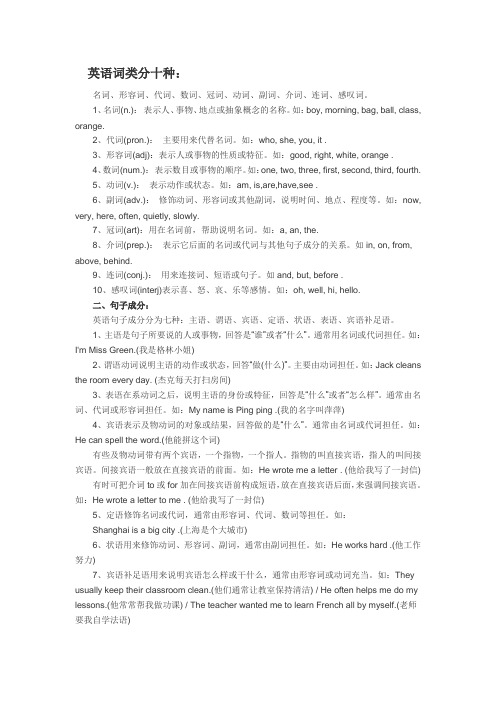
英语词类分十种:名词、形容词、代词、数词、冠词、动词、副词、介词、连词、感叹词。
1、名词(n.):表示人、事物、地点或抽象概念的名称。
如:boy, morning, bag, ball, class, orange.2、代词(pron.):主要用来代替名词。
如:who, she, you, it .3、形容词(adj):表示人或事物的性质或特征。
如:good, right, white, orange .4、数词(num.):表示数目或事物的顺序。
如:one, two, three, first, second, third, fourth.5、动词(v.):表示动作或状态。
如:am, is,are,have,see .6、副词(adv.):修饰动词、形容词或其他副词,说明时间、地点、程度等。
如:now, very, here, often, quietly, slowly.7、冠词(art):用在名词前,帮助说明名词。
如:a, an, the.8、介词(prep.):表示它后面的名词或代词与其他句子成分的关系。
如in, on, from, above, behind.9、连词(conj.):用来连接词、短语或句子。
如and, but, before .10、感叹词(interj)表示喜、怒、哀、乐等感情。
如:oh, well, hi, hello.二、句子成分:英语句子成分分为七种:主语、谓语、宾语、定语、状语、表语、宾语补足语。
1、主语是句子所要说的人或事物,回答是“谁”或者“什么”。
通常用名词或代词担任。
如:I'm Miss Green.(我是格林小姐)2、谓语动词说明主语的动作或状态,回答“做(什么)”。
主要由动词担任。
如:Jack cleans the room every day. (杰克每天打扫房间)3、表语在系动词之后,说明主语的身份或特征,回答是“什么”或者“怎么样”。
- 1、下载文档前请自行甄别文档内容的完整性,平台不提供额外的编辑、内容补充、找答案等附加服务。
- 2、"仅部分预览"的文档,不可在线预览部分如存在完整性等问题,可反馈申请退款(可完整预览的文档不适用该条件!)。
- 3、如文档侵犯您的权益,请联系客服反馈,我们会尽快为您处理(人工客服工作时间:9:00-18:30)。
代词代词分类一、人称代词二、物主代词:表示所有关系三、指示代词: 单数(this / that)和复数(these / those)This girl is Mary.These men are my teachers.This is Mary.These are my teachers.Who is that speaking? This is Mary speaking.四、反身代词如:She was talking to herself.她自言自语。
五、疑问代词: “谁(who),谁(whom),谁的(whose),什么(what), 哪个或哪些(which)”, 用来构成特殊疑问句。
六、不定代词是没有明确指定代替任何特定名词或形容词的词all,both,each,every等,以及含有some-,any-,no-等的合成代词,如anybody,something,no one。
如:--- Do you have a car?--你有一辆小汽车吗?--- Yes,I have one.--是的,我有一辆。
--- I don't know any of them.他们,我一个也不认识。
七、关系代词是用来引导定语从句的代词。
有who,whom,whose,that,which,as,可用作引导从句的关联词。
如:He is the man whom you have been looking for.This is the students whose name is Wang Hua.I know what he is coming to get.八、相互代词是表示相互关系的代词each other 互相one another互相如:They love each other.他们彼此相爱。
九、连接代词who, whom, whose, what, which, whatever, whichever, whoev er, whomever二、代词的用法:1) 人称代词:表示" 我,你,他,我们,你们,他们等" 的词叫做人称代词。
人称代词有人称,数和格之分。
人称代词可用作主语,宾语,表语I am a worker, I work in the factory.She is always ready to help us.Our teacher is very strict with us.It's me. Open the door quickly.人称代词中几个注意的情况:" she "常常代替国家, 城市, 宠物等,表示一种亲密或爱抚的感情。
I live in China。
She is a great country.我住在中国。
她是一个伟大的国家。
" it " 有时也可指人。
It's me. Open the door, please.是我,请开门。
" they " 有时代替一般人.They say you are good at computer.他们说你精通计算机。
2) 物主代词:作定语I love my country.作主语,宾语,表语以及与"of" 连接的定语。
Li Hua's bike is red, and yours is green.That car is mine, not yours.Yesterday I met a friend of mine in the street.3)反身代词:反身代词作宾语,表语,主语的同位语和宾语的同位语。
作同位语时强调"自己"。
I am teaching myself computer.I’ll be myself in no time.The child himself drew this picture.You should ask the children themselves.4) 指示代词:this 和these 表示在时间上或空间上较近的人或物。
This is a book. These are cars.that 和those 表示在时间上或空间上较远的人或物。
That is not a room. Those are trees.that 和those 还可以指前文中的事情I got up late, that's why I missed the bus.5)疑问代词:疑问代词用于特殊疑问句中,疑问代词一般放在句子的最前面,在句中可用作主语,宾语,表语,定语。
Who is here just now?Whom are you looking for?What is this?Whose exercise-book is this?Which one do you like, this one or that one?6)不定代词:不定代词代替名词或形容词.在句中可用作主语, 宾语,表语和定语。
Everybody should be here in time tomorrow.I know nothing about it. That's all.I go to school every day.any 一些,任何。
Do you have any books? You can come any time.some 一些,某些,某个。
There are a lot of flowers in the garden, some are white.Will you have some coffee, please?no 无.在句中作定语.表示否定,语气要比not any 强.She knows no English.none 无人,无物,无东西.在句中作主语,定语,宾语。
none 在句中代替不可数名词作定语时, 谓语动词要用单数形式。
none 在句中代替可数名词作定语时, 谓语动词要用复数形式。
None of them are workers.None of the money on the table is mine .many 许多.Many of the students like English very much.I have many books to give you.much 许多There is not much ink in the bottle.a few,a little,few,little. 几个,一点儿,没几个, 没多少。
Few of the books are cheap now.A few friends came to see me yesterday.I have a little money to buy the book.There is little water in the thermos.练习题1. The weather in Guangzhou is hotter than ________ in Shenyang.A. thatB. ItC. thisD. one2. Mr. Green is our English teacher. _____comes from U. S. A.A. heB. sheC. itD. they3. My bike is broken. May I borrow________?A. youB. yourselfC. yoursD. your4. Would you like some tea? Yes, just_________--.A. a fewB. fewC. a littleD. little bit5. Would you like some tea or coffee? _________. Thanks, I’ve had enough.A. eitherB. neitherC. someD. both6. I bought ___________ exercise books with __________ money.A. a few, a fewB. a few, a littleC. a little, a fewD. a little, a little7. I made the cake by ____________. Help __________, Tom.A. ourselves, yourselfB. myself, yourselfC. myself, youD. me, him8. Enjoy_____________, May and Mary.A. yourselfB. myselfC. yourselvesD. themselves9. _____________ house is this ?It’s mine.A. WhatB. WhoC. WhoseD. Whose10. She is a student and ____________ name is Mary.A. sheB. herC. hersD. his11. She will go skating and I will do _________.A. suchB. sameC. the same asD. the same12. __________ is he?He is a bus driver.A. whoB. whichC. thatD. what13. _____ hat is this?It’s __________.A. Whose, meB. Who, mineC. Whom, hisD. Whose, mine14. The population of China is larger than __________ of Japan.A. oneB. itC. thatD. those15. Li Li is clever than _______ in his class.A. anybodyB. anyone elseC. else anyoneD. somebody else16. _________ like music.A. Both of themB. Both of theyC. The both girlsD. Both them17. Could you give me some ink?Sorry, I have__________ in my bottle.A. a fewB. fewC. a littleD. little18. He has ___________ to tell us.A. something importantB. important somethingC. anything usefulD. useful nothing19. Would you like ___________ coffee? Yes, I’d like ______________.A. any, anyB. some, someC. some, anyD. any, some20. _________ of the teachers are ok in our school.A. everyB. eachC. eitherD. all21. Of the three foreigners, one is from London, ________ are from the USA.A. two othersB. the other tooC. another twoD. the both22. Which would you like, sir, tea or coffee?I don’t mind. _______ is ok.A. EitherB. NeitherC. AnyD. Both23. Help __________ to some chicken, boys and girls.A. youB. yoursC. yourselfD. yourselves24. What do you usually have for breakfast?______ milk and ______ eggs.A. Little, a littleB. A few, fewC. A little, a fewD. A few, a little25. Who taught ______ history last year?Nobody! He learned it _________.A. him, himselfB. his, himselfC. himself, himselfD. his, him26. There isn’t _______ paper here. Will you go and get __________for me?A. any, anyB. any, someC. much, manyD. many, much27. The farmer is busy because he’s so __ sheep to keep and so __ work to do.A. much, manyB. many, muchC. many, a lotD. a lot, much28. On _______ side of the river there’re many tall trees.A every B. all C. both D. each29. Whose photo is this?It’s __________.A. meB. mineC. myD. myself30. Who is playing the piano in the next room?_______ is Li Ping’s brother.A. ThisB. ThatC. ItD. He31. The old man has two sons, but __________ of them lives with him.A. bothB. noneC. neitherD. all32. You have more apples than I, but _____ are bigger than_________.A. my, yourB. my, yoursC. mine, yourD. mine, yours33. There is ________ meat at home. Would you please go and buy______?A. some, a littleB. a little, anyC. little, someD. little, any34. My parents are workers. _______ both work in the same factory.A. themB. theyC. heD. she35. Can you come on Friday or Saturday?I’m afraid _______ day is possible.A. eitherB. sameC. nayD. neither36. He can’t hear you, because there is _____ noise here.A. very muchB. too muchC. much tooD. so many37. All of us were invited, but _______ of us came.A. neitherB. noneC. bothD. any38. There isn’t __________ water in the cup.A. anyB. manyC. someD. the39. We have _________ sugar. Really? Let’s go and buy some.A. fewB. a fewC. littleD. a little40. There isn’t ____________ milk in the fridge. You’d better buy some.A. noB. anyC. someD. a few41. Help_____ to some meat, Mary.A. themselvesB. ourselvesC. yourselfD. himself42. Though they had cleaned the door, there was still __________ water on it.A. littleB. a littleC. fewD. a few43. The old man kept one black dog and two white__________.A. oneB. onesC. thoseD. one’s44. ______ of us has read the newspaper, so we know nothing about it.A. someB. bothC. noneD. all45. He is not a kind- hearted man, ________ people can get on well with him.A. fewB. a fewC. littleD. a little46. I’m old enough to wash _______ clothes. You should wash ______, too.A. my, yourB. mine, yoursC. my, yourD. your, my47. It’s too hot. Give __________ a bottle of orange.A. mineB. heC. herD. our48. When shall we meet again?___ day is OK.A. eitherB. neitherC. noneD. any49. Which of the two books will you buy?I’ll buy __, so I can give one to Joe.A. eitherB. neitherC. allD. both50. The girls are crying. ________ can’t find __________ mother.A. She, herB. They, themC. They, theirD. They, her数词一、数词有基序数和序数词两类。
